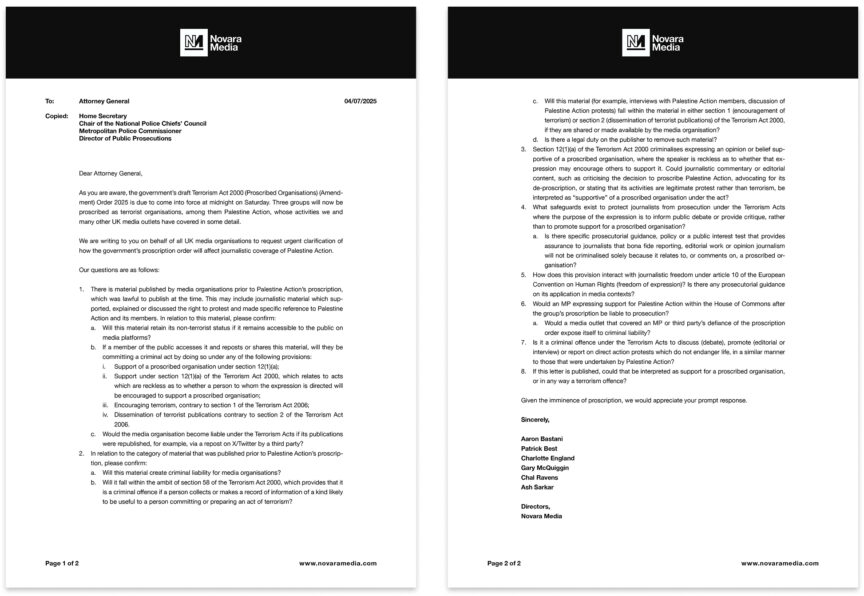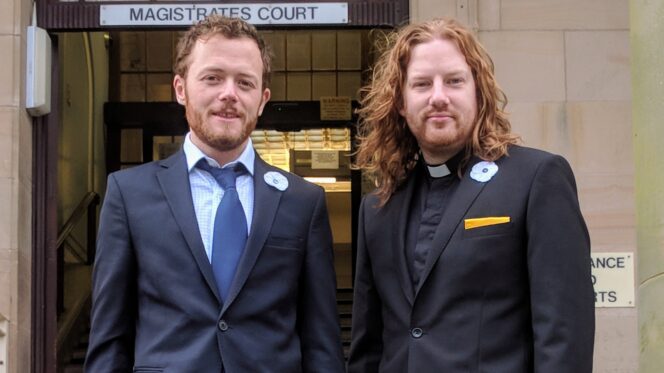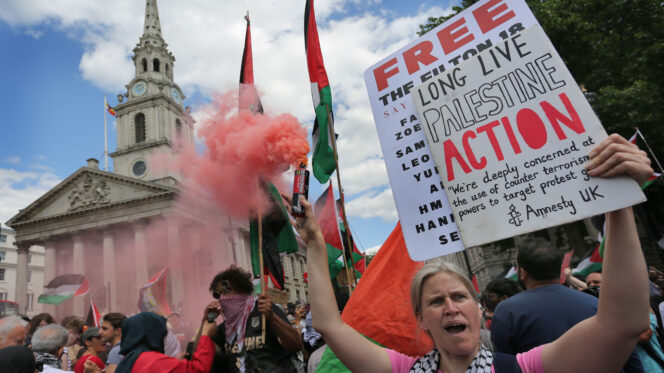Novara Media Writes to Attorney General Requesting Clarification on Palestine Action Ban
‘Journalism is not terrorism.’
by Rivkah Brown
4 July 2025

Novara Media has written to attorney general Lord Richard Hermer KC asking for urgent clarification about how the proscription of Palestine Action as a terrorist organisation will affect journalists in the UK.
In anticipation of the group’s proscription, Novara Media’s directors asked the attorney general on Friday to clarify whether material published prior to proscription could breach terror laws if it remains published, or is re-shared, after proscription. The directors have also asked whether criticising the proscription itself could be deemed supportive of Palestine Action, and whether continuing to report on Palestine Action’s activities would constitute a terror offence.

The order to proscribe Palestine Action, a direct action group established in 2020 to target Israel’s largest weapons company, was approved by the House of Lords on Thursday after the Commons passed it by 385 votes to 26 on Wednesday. This means that unless Palestine Action is successful in winning a temporary stay on its ban, which it is seeking in court today, being a member of or expressing support for Palestine Action will become a terror offence at midnight on Saturday morning.
“Novara Media views the proscription of Palestine Action as appalling state overreach. Today, we have written to the attorney general to seek clarity on how the ban will be enforced for journalists,” said Charlotte England, a member of Novara Media’s board of directors.
“We are concerned that without this clarification, the opaque nature of the new legislation, combined with the strong public interest imperative to report on Palestine Action, could leave our journalists, and journalists elsewhere, exposed and unable to do their jobs legally and safely. Journalism is not terrorism.”
The UK’s terrorism laws are notoriously vague and liberally applied, including to media professionals. In October last year, police raided the home of Electronic Intifada journalist Asa Winstanley, a raid later ruled unlawful. Judge Mark Lucraft KC said he was “very troubled” that electronic devices “were … seized from a journalist”. In August, police arrested journalist Richard Medhurst at Heathrow airport and seized his devices under counter-terror laws, prompting outrage from the National Union of Journalists.
While in theory journalistic material – including communications with contacts and sources – is legally privileged, in practice police have on several occasions seized journalists’ devices under the auspices of counter-terror legislation. In 2015, BBC journalist Secunder Kermani had his computer seized by police after he interviewed a member of Isis.
In 2013, American journalist Glenn Greenwald’s partner David Miranda was detained at Heathrow airport for nine hours under schedule 7 of the Terrorism Act 2000, which allows border police to stop, search and question individuals with no right to remain silent or to a lawyer. Police released Miranda but confiscated his electronic devices, including encrypted storage devices. Greenwald was at the time working with US whistleblower Edward Snowden.
The government’s own terrorism experts have expressed concern that the UK’s terrorism laws too easily ensnare journalists. In a 2014 report, the government’s independent reviewer of counter-terror law David Anderson KC wrote that “to bring activities such as journalism and blogging within the ambit of ‘terrorism’; (even if only when they are practiced irresponsibly) encourages the ‘chilling effect’ that can deter even legitimate enquiry and expression in related fields.”
There are widespread fears that journalists will be caught under counterterror laws after the proscription of Palestine Action, an organisation that has generated significant media interest and public support. In its letter, Novara Media asked the attorney general whether covering that support could constitute a terror offence.
On Tuesday, five leading UN experts issued a statement expressing their fears that the Labour government was misusing terror laws to proscribe Palestine Action. “We are concerned at the unjustified labelling of a political protest movement as ‘terrorist’,” they said. “According to international standards, acts of protest that damage property, but are not intended to kill or injure people, should not be treated as terrorism.”
Amnesty International and the head of Human Rights Watch UK have also condemned Palestine Action’s proscription, the latter calling it “a grave abuse of state power and a terrifying escalation in this government’s crusade to curtail protest rights”. Several media outlets have done the same, including Novara Media, which issued a statement opposing the ban on Tuesday.
Rivkah Brown is a Novara Media commissioning editor and reporter.


